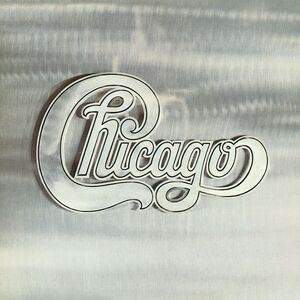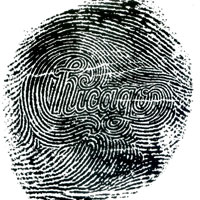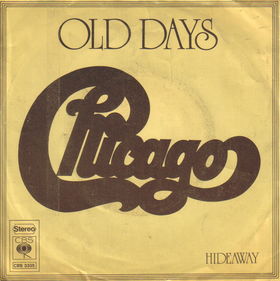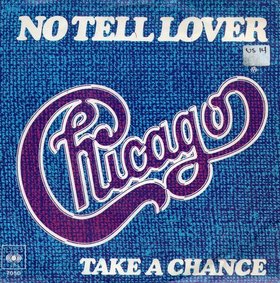
Chicago is the second studio album by the American rock band Chicago. Like their debut album, Chicago Transit Authority, this was a double album. It was their first album under the name Chicago and the first to use the now ubiquitous cursive Chicago logo on the cover.

Chicago VI is the fifth studio album by American rock band Chicago and was released on June 25, 1973 by Columbia Records. It was the band's second in a string of five consecutive albums to make it to No. 1 in the US, was certified gold less than a month after its release, and has been certified two-times platinum since. It is the first album to feature percussionist Laudir de Oliveira, who would become a full-fledged member of the band for Chicago VIII. VI is the first studio album to feature the original band members on the cover before the death of leader and co-founder Terry Kath.

Chicago IX: Chicago's Greatest Hits is the first greatest hits album, and ninth album overall, by the American band Chicago and was released in 1975 by Columbia Records in both stereo and SQ quadraphonic versions.

Chicago XIV is the twelfth studio album by American rock band Chicago, released on July 21, 1980. Recorded at a time of waning interest in the band, Chicago XIV remains one of Chicago's poorest-selling albums, failing to reach Gold certification by the Recording Industry Association of America (RIAA), and was deemed a commercial flop. It is also notable for being their last studio album with Columbia Records, and the last one to feature percussionist Laudir de Oliveira.

The Very Best of Chicago: Only the Beginning is a double greatest hits album by the American band Chicago, their twenty-seventh album overall. Released in 2002, this collection marked the beginning of a long-term partnership with Rhino Entertainment which, between 2002 and 2005, would remaster and re-release Chicago's 1969–1980 Columbia Records catalog.

"Saturday in the Park" is a song written by Robert Lamm and recorded by the group Chicago for their 1972 album Chicago V. It was very successful upon release, reaching No. 3 on the Billboard Hot 100, and became the band's highest-charting single at the time, helping lift the album to No. 1. Billboard ranked it as the No. 76 song for 1972. The single was certified Gold by the RIAA, selling over 1,000,000 units in the U.S. alone.

"Questions 67 and 68" is a 1969 song written by Robert Lamm for the rock band Chicago and recorded for their debut album Chicago Transit Authority. It was their first single release. Peter Cetera is the primary lead singer with Lamm also on vocals. In 2015, Dave Swanson, writing for Ultimate Classic Rock, listed the song as ninth in a list of top ten Chicago songs. Writing for Rock Cellar magazine, Frank Mastropolo rated the song as number 11 in a list of "Top 11 Question Songs".

"Free" is a song written by Robert Lamm as a part of the "Travel Suite" for the rock band Chicago and recorded for their third album Chicago III (1971), with Terry Kath singing lead vocals. It was the first single released from this album, and peaked at #20 on the U.S. Billboard Hot 100.

"Lowdown" is a song written by Peter Cetera and Danny Seraphine for the rock band Chicago and recorded for their third album Chicago III (1971). It was the second single released from this album, and peaked at No. 35 on the U.S. Billboard Hot 100. Cetera provided lead vocals while guitarist Terry Kath used a fuzzbox and wah-wah pedal for his guitar solo and Robert Lamm made prominent use of the Hammond organ.

"Dialogue" is a song written by Robert Lamm for the group Chicago and recorded for their album Chicago V (1972). On the album the song is over 7 minutes long and is divided in two parts. An edited version was released as a single in October 1972, eventually reaching #24 on the U.S. Billboard Hot 100. A live recording of the full song can be heard in Chicago XXXIV: Live in '75. Part II was included in Greatest Hits, Volume II (1982).

"Just You 'n' Me" is a song written by James Pankow for the group Chicago and recorded for their fifth studio album Chicago VI (1973). The lead vocals are sung by bassist Peter Cetera.

"(I've Been) Searchin' So Long" is a song written by James Pankow for the group Chicago and recorded for their album Chicago VII (1974). The first single released from that album, it reached number 9 on the U.S. Billboard Hot 100. It also hit number 8 on the Adult Contemporary chart. In Canada, the song peaked at number 5.

"Call on Me" is a song written by Lee Loughnane for the group Chicago and recorded for their album Chicago VII (1974). Peter Cetera sang lead vocals and the arrangement makes prominent use of conga drums played by Guille Garcia.

"Wishing You Were Here" is a song written by Peter Cetera for the group Chicago and recorded for their album Chicago VII (1974), with lead vocals by Terry Kath, while Cetera sang the song's bridge. The third single released from that album, it reached No. 11 on the U.S. Billboard Hot 100, No. 9 on the Cash Box Top 100, and hit No. 1 on the Easy Listening chart.

"Old Days" is a song written by James Pankow for the group Chicago and recorded for their album Chicago VIII (1975). It was the second single released from that album with lead vocals by Peter Cetera.

"Another Rainy Day in New York City" is a song written by Robert Lamm for the group Chicago and recorded for their album Chicago X (1976). Described as "the only typical Chicago cut on the album[:] upbeat and light with good blending of lead vocal by [Peter] Cetera", the track would be the album's lead single but was largely passed over for radio airplay in favor of the album cut "If You Leave Me Now". Rush-released as a single, "If You Leave Me Now" debuted on the Billboard Hot 100 of 14 August 1976 at No. 60 - on its way to No. 1 - and immediately eclipsed "Another Rainy Day..." which on the same chart fell to No. 46 from its No. 32 peak. "Another Rainy Day..." peaked at No. 2 on the Billboard Adult Contemporary chart. Billboard described the song as "a pop/jazzy rocker with a touch of reggae flavor." Cash Box said that "the lyric is good, really creates a mood." Record World called it a "Caribbean-styled number is handled with the band's consummate professionalism and good taste."

"Baby, What a Big Surprise" is a ballad written by Chicago's then bassist/singer Peter Cetera, which appeared on their album Chicago XI (1977), with Cetera singing lead vocals. The first single released from the album reached number 4 on the US Billboard Hot 100 chart.

"Alive Again" is a song written by James Pankow for the group Chicago and recorded for their album Hot Streets (1978), with Peter Cetera singing lead vocals. The first single released from that album, it reached No. 14 on the U.S. Billboard Hot 100 chart. In Canada, "Alive Again" spent two weeks at No. 11.

"No Tell Lover" is a song written by Lee Loughnane, Danny Seraphine, and Peter Cetera for the group Chicago and recorded for their album Hot Streets (1978), with Cetera and Donnie Dacus singing lead vocals. The second single released from that album, it reached No. 14 on the U.S. Billboard Hot 100 chart and No. 5 on the adult contemporary chart.

"Brand New Love Affair" sometimes alternatively listed as "Brand New Love Affair (Parts I and II)", is a song written by James Pankow for the group Chicago and recorded for their album Chicago VIII. The song peaked at #61 on the charts. Guitarist Terry Kath sings the first half while bassist Peter Cetera sings the second half. Keyboardist Robert Lamm played the distinctive Fender Rhodes electric piano on the song—the intro particularly showcases its lush vibrato bell-like sound.




















